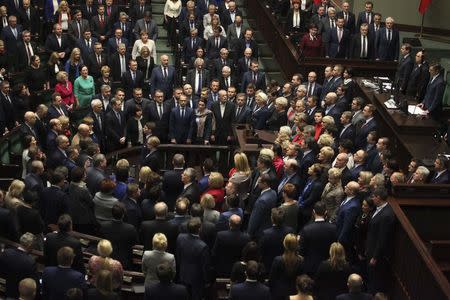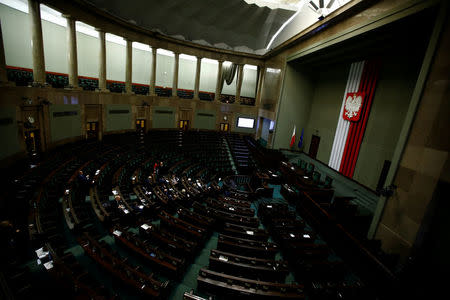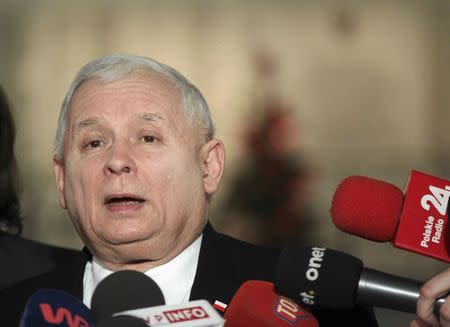Ruling conservatives reconvene Polish parliament despite opposition blockade
By Pawel Sobczak and Agnieszka Barteczko WARSAW (Reuters) - Poland's parliament resumed proceedings after the winter recess on Wednesday in defiance of an opposition blockade of the plenary hall, escalating a stand-off that has raised fears for democracy in the European Union state. The centrist opposition Civic Platform had sought to delay the reopening of the assembly after the Christmas and New Year holidays, vowing to continue a nearly month-long sit-in unless the ruling conservatives agreed to a re-run of a budget vote. The crisis began in mid-December when opposition lawmakers blocked the plenary hall podium to protest at conservative plans for curbs on media access to parliament. It worsened when they accused the ruling party of passing the 2017 budget illegally in a side room without the requisite quorum of lawmakers. Dismissing the accusations, the ruling Law and Justice (PiS) party held a Senate vote to approve the budget - the next step towards enactment - and reopened the lower house of parliament. "Parliament will continue to operate normally tomorrow," PiS deputy Arkadiusz Mularczyk told private broadcaster TVN24. "I hope we will vote on new legislation. I hope the PO will be reasonable because the protest does not serve Poland well." The stalemate in parliament has laid bare divisions in Poland that have deepened since the euroskeptic PiS ousted the PO from power in the 2015 election. The conservatives remain generally popular among voters thanks to a blend of nationalism, Roman Catholic piety and steps to help poorer Poles who have not benefited much from a decade of heady economic growth in the formerly communist country. But the PiS has also drawn mounting criticism at home and abroad for what many see as a drift towards authoritarian rule. Voicing concern over "a systemic threat to the rule of law" in Poland, the European Commission in December gave the PiS government two months to sort out questions surrounding its moves to assert more control over the judiciary and media. Standard and Poor's downgraded Poland's debt ratings a year ago, citing increasing questions about the independence of key Polish institutions under the PiS government. The dispute over the 2017 budget began when PiS lawmakers retreated to an auxiliary chamber of parliament in December to sidestep the opposition blockade. The opposition then said it had been prevented from taking part in the proceedings and accused the PiS of lacking a quorum to hold a legal vote. "For the moment, we continue to block the podium. Tomorrow we decide exactly how to proceed with our protest," Joanna Mucha, a PO deputy, told private broadcaster TVN24 after the PiS speaker announced parliament was back in session. This was preceded by hours of emergency meetings among senior party officials seeking to defuse the standoff. In an apparent gesture on Monday to forge a compromise, the conservatives withdrew plans to limit how journalists can cover parliamentary proceedings, a proposal that sparked public protests in December. But the PO said the move was not good enough and again demanded a re-run of the budget vote. (Additional reporting by Lidia Kelly, Anna Wlodarczak-Semczuk, Pawel Florkiewicz and Marcin Goclowski; writing by Justyna Pawlak; editing by Mark Heinrich)




